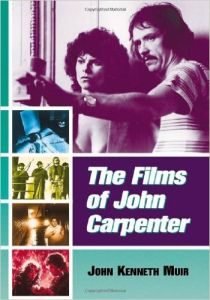The Films Of John Carpenter by John Kenneth Muir (book review).
When John Kenneth Muir’s book, ‘The Films Of John Carpenter’, appeared in Eurospan’s UK books distributed over here this year, I thought it would make a good accompaniment to Titan Books ‘On Set With John Carpenter: The Photographs Of Kim Gottlies-Walker’ by Kim Gottlies-Walker that came out last year. When you consider that John Carpenter has directed 16 films from 1975-1998, things have been a bit quiet since then. I’ve only missed two of them but will keep an eye open for them now. He’s also produced and written 5 other films and 2 TV productions. I should also point out that this book is set in two column mode so there is plenty to read.
Muir’s assessment is not a love letter to Carpenter because he assesses the good and the bad, as well as looking at some of factors that have dogged his failures. When you see the other films that were released in those years, you do understand why the studios tend to spend more time assessing the best release dates these days. Although ‘The Thing’ (1982) and ‘Starman’ (1984) are revered these days, they didn’t do so well on their initial release. Muir’s comments that Carpenter wanted to cover all his genres, even if they were disguised a bit as in ‘Assault On Precinct 13’ (1976) which was conceived as a western. People shouldn’t forget that his initial ‘Halloween’ (1978) film built up the ‘slasher’ sub-genre that we have today and one of the appendixes lists a lot of films that wouldn’t have been made otherwise. It’s also fascinating seeing Carpenter recycle names of parts and actors whom he admired into characters in his films.
When it gets down to looking at the individual films, Muir really gets into his element. Although there might be review quotes at the beginning, then film credits and synopsis, the ‘Commentary’ is all his own analysis and if there are any quotes, it’s from either Carpenter or members of his various cast. At long last, an author who isn’t scared to write his own opinions.
I hadn’t realised that ‘Dark Star’ (1975) was the first film to use light streaks for faster-than-light speeds. I had a think about that, seeing if there was any films earlier. Even the original ‘Star Trek’ never went that wild until ‘The Motion Picture’, although I suspect their budget prohibited it. ‘Star Wars’ came a year later but you have to remember that ‘Dark Star’ was initially a student film so its release date wasn’t when it was made or revised at a longer length.
With ‘Halloween’ (1978), Muir points out that we don’t actually see any blood when Michael Myers repeatedly stabs anyone. Back in those days, blood violence on screen could mean not getting a cinema classification at all. From my point of view, I suspect Carpenter wanted to highlight the suspense in the same way as Hitchcock, one of his idols, would have done and let the imagination do most of the work. I have a feeling that this also contributed to why later films in this series failed to catch more viewers.
When I read the comments that Muir makes about ‘Starman’ being a perfect film, I realised why I stayed away from the next few Carpenter films as perfection is hard to beat, although I did see ‘Prince Of Darkness’ a couple years back and didn’t find it so memorable. Looking in a retrospect, the way Carpenter moved from film to film in different genres is very similar to how many actors like or can shift across genres so they never got trapped in any particular one. Although Carpenter started in SF, it was ‘Halloween’ that got him tagged as a horror film maker and he never shook that off entirely. A demonstration of how Hollywood can pigeon-hole you if you let them.
What I found odd when Muir discusses the five films that Carpenter wrote prior to his director’s star rose and the first two ‘Halloween’ sequels is that there is barely a mention of what the original drafts were like. Granted it might have been difficult to get hold of them but it would have been interesting to see the contrast between them and the final product. This is probably true of most American films where other scriptwriters are brought in to polish the drafts but here the changes would have been equally important.
I do actually like ‘The Philadelphia Experiment’ (1984) that Carpenter wrote the first draft, mostly for its olde world charm. I didn’t realise that Carpenter couldn’t figure out what to do with the story’s ending. Some analysis on my part about why David Herdeg chose to live in our present than go back to the past, even if he wasn’t in love, is because he knows his own fate from his sailor mate, Jimmy Parker, who did return in that he never got back.
As you can tell from the length of this review, I found this book an enjoyable experience. Muir points out that it’s unlikely that John Carpenter will ever get an Oscar Achievement Award for his films but after reading here, you have to wonder at what kind of films would have been out there had he not been around.
GF Willmetts
October 2016
(pub: McFarland, 2000. 265 page illustrated indexed enlarged paperback. Price: £23.50 (UK), $25.00 (US). ISBN: 978-0-7864-2269-2)
check out websites: http://www.mcfarlandpub.com/ and www.eurospanbookstore.com





